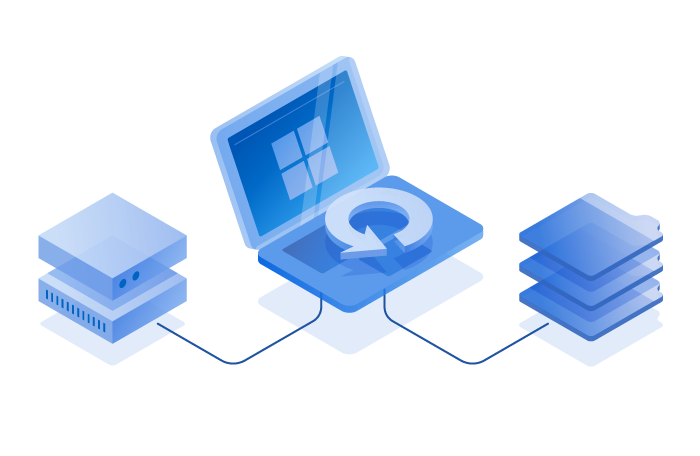
In today’s world, where the security of data is uncertain, backup servers are necessary for enterprises, especially for those that deal with mission-critical data. This is mainly due to the fact that these servers are responsible for all of the enterprise data backup tasks and backup jobs. Some of these jobs include; scheduling many enterprise backup jobs and committing thousands of associated backup details to the database of the enterprise.
So, this makes a data backup server very important and a must-have for any enterprise that deals with mission-critical data and this is what we will discuss in this article, along with the reasons that why do you need a backup server.
The threat of Data Loss
One of the main reasons why enterprises need a backup server is for the protection of their mission-critical data.
As mentioned above, data is vital for enterprises that deal with mission-critical data every day. There have been so many instances where an enterprise’s business is growing rapidly and they are moving towards success and then suddenly a hard disk fails, or data is deleted or corrupted due to human error or malware strikes, and there are absolutely no backups for the enterprise to recover from and as a result, all of the mission-critical data is lost forever.
Apart from the loss of data, this can lead to enterprises starting from scratch and losing all of their clients and reputation as well.
Enterprises that do not have a backup server where they can back up their important data and recover it in the time of need, can potentially dent their business growth as in case data is lost, all of their business growth is stopped instantly, and are scarred with a bad reputation.
This is why a backup server is important and is needed as it would have backed up their data and they would be able to recover all of their lost data instantaneously.
The threat of Ransomware
Ransomware is another reason that makes a backup server a must-have for enterprises. The threat of ransomware will always be there as ransomware has been around for ages and is not going away any time soon, and without any data backup and backup server, it is impossible to recover from a ransomware attack.
Enterprises dealing with mission-critical data need to protect and backup all of their data from ransomware attacks as these attacks are constantly evolving and are becoming a lot more difficult to handle each passing year.
Many enterprises do not consider the fact that they may fall victim to such attacks and risk not backing up their data, and in the event of an attack, they end up losing all their mission-critical data.
This is actually alarming as unless you have been living under a rock, everybody knows that ransomware attacks have increased significantly and without being prepared beforehand, that is backing up data, it is pretty much impossible to recover from an attack. So, it is best to be prepared instead of losing sleep after.
Without any data backup or a backup server, enterprises can lose a lot more than just data. These attackers ask for a hefty amount of ransom money from the enterprise in exchange for the decryption key. However, paying the ransom is not recommended as there is no way to track these attackers as they demand payment in bitcoin so there is no stopping them from asking for the ransom money again and again and bullying the enterprise, and not giving the decryption key to the enterprise.
This is why enterprises should not wait for a ransomware attack to happen. They must protect all of their enterprise mission-critical data at once and this can be done by backing it up to a dedicated backup server. So, in case of a ransomware attack, they can restore that data without having to pay a ridiculous amount of ransom.
The Threat of Natural Disasters
Another reason for getting a backup server is natural disasters. While it is true that natural disasters can not be avoided, it does not mean that enterprises have to suffer data loss as well.
Having a backup server enables enterprises to back up their data safely and securely without having to worry about any data loss whatsoever.
This way, no matter how serious and damaging the natural disaster is, they will be at peace about the security and the availability of their data as all of their mission-critical data would have been backed up in a safe and secure location, whether it’s the cloud or an off-site location or even both.
Having data backed up in a backup server also enables the enterprise to remain operational and continue their business even through a disaster. How? Well, with data backed up in the backup server, IT admins can recover data in an off-site location and can continue operations from anywhere in the world. This way, the business will remain operational even if the primary site is compromised or is inaccessible.
The main advantage of this is that the enterprise doesn’t necessarily have to wait for the disaster to blow over, they can operate from anywhere in the world and make sure that their servers and business remains operational.
Vendors like StoneFly offer dedicated backup server appliances. These appliances are high-performance appliances that would help enterprises speed up their data backups and also offer many additional optional features along with backing up data as well, such as; advanced data encryption, air-gapped volumes, data deduplication, and much more.
So, getting a backup server has many advantages and makes business sense for the enterprise as it secures their data and avoids all kinds of data loss.
Conclusion
Backing up data has become a necessity nowadays due to the many threats of data loss discussed in this blog. Backup servers help greatly in avoiding data loss. Backup servers not just automate the backup jobs, they also protect the enterprise’s mission-critical data against the many threats of data loss. So, this makes backup servers a must, especially for those enterprises that deal with mission-critical data.

Qais Noori is the technical marketing and SEO expert at StoneFly, Inc. since 2015. StoneFly is the provider of enterprise-grade and value-tier storage, backup and DR appliances, physical, virtual, and cloud-based solutions, data migration services, and solutions for managed service providers (MSP). StoneFly’s robust range of enterprise products includes purpose-built NAS, SAN, unified NAS + SAN, and hyperconverged solutions (storage and backup & DR).

